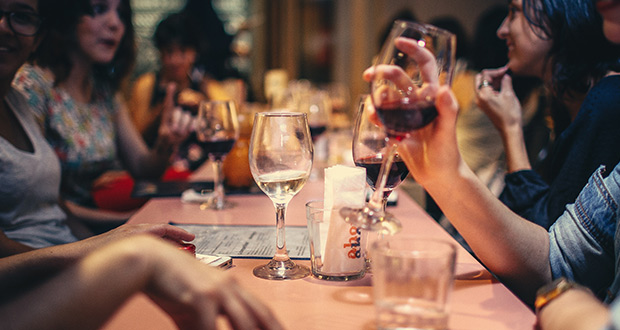New Research Lifts Lid On Peer Pressure Culture Around Alcohol

 Rounds encourage one in three to drink more than intended and a third of Brits are too polite to refuse a drink
Rounds encourage one in three to drink more than intended and a third of Brits are too polite to refuse a drink
A third (35%) of UK drinkers drink more than they intended because they were encouraged by others, reveals a new study by independent alcohol education charity, Drinkaware.
More than one in three (37%) UK adults who drink report drinking more alcohol than they set out to because they were in a round, and a third (34%) drink more because they did not want to be impolite and refuse a drink.
Overall, Drinkaware’s annual monitor of more than 2,000 UK adults found that a majority of Brits who drink (57%) say they would like there to be less pressure to drink alcohol. Slightly over a third of drinkers (35%) say that pressure to drink alcohol is common in their age group (rising to 60% of those aged 18-34).
Some people employ avoidance tactics; over a third polled (37%) admit to having nursed their drink to avoid pressure to have another, while one in ten (11%) admit to actively seeking friends who drink little or no alcohol.
Almost a third of drinkers (29%) drink more because they want to keep up with others. Friends are chief influential figures, with 60% of those who drink more than they intended to saying that they have been pressured by friends.
Among working adults (who drink), two-fifths (43%) agree that there is too much pressure to drink when socialising with work colleagues. One in five reported their co-workers have pressured them to drink more than they’d set out to. Men in particular are more likely than women to have experienced pressure to drink from their boss or superior (13% compared with 8%).
Drinkaware’s research also reveals that a significant proportion of British adults are contributing to a culture of pressure; one in five (21%) adults who drink admitted to having encouraged someone to drink more alcohol after they said they didn’t want to. A similar number had given someone an alcoholic drink or topped up their glass without asking first (19%).
Drinkaware’s Chief Executive, Elaine Hindal, says: “Our research lifts the lid on a culture of peer pressure in this country. It speaks volumes that over half the adult population say they would like there to be less pressure to drink.
“And it seems from our new research that being polite, not wanting to confront a situation and feeling the need to keep up could be preventing many of us from standing up to that pressure.”
While the number of people who drink at least once a year has decreased year-on-year (81% of UK adults compared with 84% in 2018), the results show pressure to drink could be impacting the drinking patterns of ‘risky drinkers’ (those at most risk of health harms because of their drinking levels). Almost half (46%) reported drinking more than they’d intended because they were encouraged by others, compared with a UK average of just over a third (35%) and 14% reporting that this happens regularly (monthly or more often). This is true of only four percent of low risk drinkers. Similarly, almost one in ten ‘risky drinkers’ (eight percent) admit to regularly encouraging others to drink after they’ve said they don’t want to. This is compared with only one percent of low risk drinkers.
Elaine adds: “Pressure to drink in the majority of cases isn’t malicious, it may not even be conscious. Most people just want the people they’re with to have a good time. But regularly drinking alcohol above recommended levels can significantly increase your risk of developing a range of diseases.
“It’s crucial that people are aware of the health harms of drinking more than the low risk drinking guidelines. Being armed with the facts could make people feel more confident in resisting pressure, as well as making many of us think twice about topping up a friend’s glass.”
